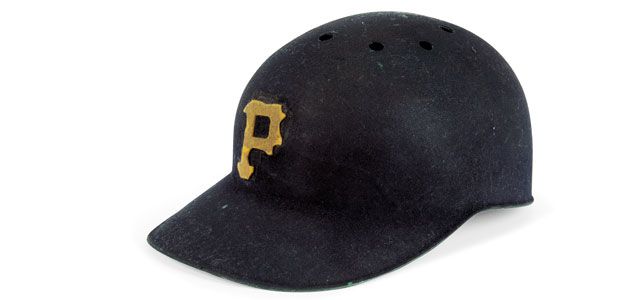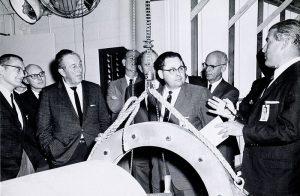Roberto Clemente was born and raised in the small town of Carolina, Puerto Rico in the early 1930’s. He was the youngest of seven children.1 From a young age he excelled at baseball and at the track event Javelin. At age eighteen, he tried out for the Brooklyn Dodgers. Roberto made the team with ease in 1952, but this is where his trials began. The Dodgers had five African-American players on the team already, including the famous Jackie Robinson. The owners saw no need for another “colored” player on the team.2

After his contract with the Dodgers’ minor league team in Montreal expired, the young Pittsburgh Pirates organization picked up Clemente in order to rebuild their team. But the Pirates didn’t give him a lot of playing time either, so he decided to return to Puerto Rico.3 But in 1956, after dominating back in his home town, Roberto finally caught his break with the Pirates. He returned to the United States, and he began to rise in fame rapidly, gaining success in the League. In his first season he finished with a batting average of .255. This success didn’t smash the curveball that was thrown his way because of his race. On several occasions, his teammates called him a “nigger.” It was also common for Clemente to stay in separate hotels from the white players on the team, due to segregation laws. Young Clemente was not even treated as an equal in the sport that he had been working so hard for years to adapt to.4 Whether it was the law, or people’s racial prejudices, Clemente continued to remain the outsider.
The Pirates eventually won the World Series in 1960, and Roberto Clemente finished that season with the stellar batting average of .310. As Clemente began to rise in fame, and people began to realize his potential for greatness, he began to receive death threats in the mail. One of the letters read “Did you ever get shot before?”5 In fear for his family’s safety, Clemente moved them home to Puerto Rico in order to protect them from such bigoted Americans of the 1960’s. After moving his family back to Puerto Rico, Clemente told the media, “I don’t want to be put down because I’m Puerto Rican. I don’t stand for disliking someone because of their color. If this is the case, I don’t want to be living. I am a double nigger….. for my skin and my heritage.”6
After Clemente moved his family back to Puerto Rico, and bounced back from the serial experience of death threats, and he became the League’s MVP in 1966.7 Clemente refused to let others keep him down because of the color of his skin. Clemente was not only an inspiration to people on the field, but was so off the field as well. In his spare time he would visit Puerto Rico in order to spend time with his family. But he also gave back to the struggling community he grew up in by helping out in the local clinic in Carolina. He also opened youth baseball programs for kids in Puerto Rico.8 Roberto helped raise over $150,000 for his home town. Clemente’s love for others, and actions in order to help his people and the community, was recognized by people all over the United States. He was becoming one of the most well-known athletes not only for his incredible playing abilities, but for his devotion to his personal humanitarian aspirations.
Then suddenly, on New Years Eve in 1972, while flying to Nicaragua to drop supplies off after a tragic earthquake, Roberto Clemente’s plane crashed. There were no survivors and Roberto Clemente’s body was never found. The plane was allegedly 1,900 kilograms over the weight it could carry.9

Roberto Clemente finished his career with over 3,000 hits, 4 World Series titles, 12 Golden Gloves, a two-time League MVP, and was inducted into the Hall of Fame in 1973.10 Roberto Clemente is remembered in Major League Baseball for so much more than these incredible stats. To this day, the MLB gives the Humanitarian Award to baseball players who best exemplify service to their team, community, and families.11 Clemente will forever be recognized for his love for others. And he fought for a sport he loved. There is much diversity in the MLB today, whether it is Yu Darvish from Japan, Didi Gregorius from the Netherlands, Arolodis Chapman from Cuba, or Carlos Correa from Puerto Rico. Clemente is a major reason for this diversity. He received death threats and experienced discrimination because of his color. But, most importantly, after all these trials, Clemente still managed to give back to his community and love others, which is why he’s an inspiration to Latinos and to people everywhere.
- Alan West, Roberto Clemente: Baseball Legend (Brookfield, Conn: Lerner Publishing Group, 1993), 6. ↵
- Salem Press Biographical Encyclopedia, January 2017, s.v. “Roberto Clemente,” by Lynn C. Kronzek. ↵
- Alan West, Roberto Clemente: Baseball Legend (Brookfield, Conn: Lerner Publishing Group, 1993), 10-12. ↵
- Alan West, Roberto Clemente: Baseball Legend (Brookfield, Conn: Lerner Publishing Group, 1993), 10-12. ↵
- Roberto Clemente. n.p.: (Washington, D.C.): Federal Bureau of Investigation, 2003. ↵
- Alan West, Roberto Clemente: Baseball Legend, (Brookfield, Conn: Lerner Publishing Group, 1993), 13. ↵
- Salem Press Biographical Encyclopedia, January 2017, s.v. “Roberto Clemente,” by Lynn C. Kronzek. ↵
- Alan West, Roberto Clemente: Baseball Legend (Brookfield, Conn: Lerner Publishing Group, 1993) 19-25. ↵
- Madeleine White, “Baseball’s Roberto Clemente dies in a plane crash,” Globe & Mail , 2015, A2. ↵
- Salem Press Biographical Encyclopedia, January 2017, s.v. “Roberto Clemente,” by Lynn C. Kronzek. ↵
- Wes Lukowsky, “Clemente: The True Legacy of an Undying Hero,” Booklist 110, no. 1 (2013): 30. ↵



53 comments
Maria Callejas
First and foremost, great title! It truly shows the legacy that Roberto Clemente left for both baseball and the Latino community. Your great use of evidence provides a meaningful insight into the life of such great human being. His character was key for her perseverance in a highly discriminatory sport and country. What is truly amazing to see is that even though he was targeted with hate, he only gave love back. As a Nicaraguan, I have known about Roberto Clemente ever since grade school, as he passed away because he wanted to aid my country after the 1972 earthquake. His last action in his life was a humanitarian one, being the MVP of people’s hearts. Good job!
Josemaria Soriano
Roberto Clemente had it all: batting better than anyone and thanks to this special ability he won four offensive titles in the First Division; he was also a good candidate for the Golden Glove award for 12 times. For 18 years the Pittsburgh Pirates number 21 marveled at the baseball universe. Little did the attacks that the press constantly directed against him, because he had no hair on his tongue and criticized the discrimination received by Latinos in the United States. Personally, what struck me the most was his death, because it was something that nobody expected. Very rarely are athletes as supportive as he. He was not only a baseball player, but also a fighter. Despite being dark, Latino and not knowing how to speak Spanish, he managed to show himself to the world and give himself a place. And he was not only an athlete who financed, but he himself wanted to go to deliver the aid, cause that pitifully end his life. Clemente is great, and his courage and solidarity should not be forgotten by our generation. May God have him in his glory.
Rebekah Esquivel
Roberto Clemente was one of the many baseball athletes to fight for equality within sports. Not only was he an amazing player but he was also an inspiration to everyone. It takes a certain kind of person to push through criticism and such racism in order to prove a point and fight for what they know is right. Although he didn’t get his shot at first with the Dodgers Clemente continued to play baseball and eventually found his way into the majors. The whole time experiencing racism from fans, players, and teammates he fought through it making history for himself and the sport of baseball. It’s so sad the way his life ended but he impacted the world of baseball greatly in his time playing. This was a great article.
Eduardo Foster
What a great article! It is very inspirational how he helped his country and was such a great player! Even though all the barriers he pass through he achieved to play in the MLB have such a successful career. He is such a sample as a person , this article is very motivational! Great article and keep it up with the good work !
Andrew Rodriguez
Roberto. Clemente was a major stepping point in the baseball history. By bringing in a new demographic, fighting through the a whole bunch of trials being treated unfair stripped of playing time just for ethnic reasons. It’s a repeat on what Jackie Robinson had to go through. His journey began of to a troubling start by being by entering into the MLB’s and having to leave to reprove his worth again. This must’ve been frustrating in the fact that he was the best player on his team but never got the playing time. The article was very entertaining and well researched.
Carlos Aparicio
I have never heard of Roberto Clemente but after reading this descriptive article, he is a hero for all of Major League Baseball. I can’t imagine receiving death threats and still managing to give back to his community. Clemente was not only a gifted baseball player, but an amazing human being. It’s a shame that he died in a crash, but his legacy will forever carry on. I love topics like this one.
Tara Sellers
I like how he did not let what others said or did affect how he was as a person. Even with people treating him with disrespect he helped others who were less fortunate than him. Also, I bet it was hard for him to be so far from his family. It is not fair that he did not find it safe to have them in the United States.
Joshua Breard
I am not the biggest of baseball fans but I definitely know who Roberto Clemente. He is a hero to all people with his accomplishments in the sport and through dealing with all the backlash he got from all the racists in the world. Despite him not receiving the playing time he deserved, he continued to play the sport that he loves and it worked out in the end for him. Great article and great story!
Michael Mandujano
I was influenced to read this article, because of its featured image. I really enjoy the game of baseball, so after seeing this vintage Pittsburgh Pirates helmet, this article was a must read. After reading this article, I gained knowledge of another prominent athlete who experienced racial discrimination. Overall, this article was inspirational because Roberto Clemente a Latino athlete did not allow any of the social injustices in the league deprive his game.
Josselyn Arrieta-Meraz
When I saw the cover picture he looked familiar, someone you know is known for something but you don’t actually know what it is. After reading this article It makes me fell sad and happy at the same time to think that after all Roberto Clemente went through he was still able to stick to what he knew he wanted and loved, he proved everyone wrong, and to think that racism was still a problem in teams in the 1960’s although not that long ago the issue is still present now in day, Clemente serves as an exemplary example of want it is to persevere in different ways.